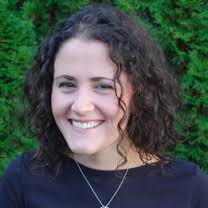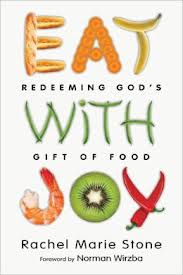Today we have a real treat (a witty pun–give it a minute): an interview with Rachel Marie Stone, author of Eat with Joy: Redeeming God’s Gift of Food. This isn’t a “guide to healthy eating” but a book that redeems food–it shows how food and shared meals are means of relating to God and each other. In other words, this is a theology book of the most practical sort, and her words of wisdom ring deeply true.
Rachel is a regular writer for Christianity Today’s Her.meneutics blog. She has also written for numerous publications, including Christianity Today, Books and Culture, and Relevant. Her next book is God’s Upside-Down Kingdom, the third volume of the children’s Bible curriculum Telling God’s Story. Rachel lives in Malawi and blogs at rachelmariestone.com. You can find her full bio here.
Food and religion. There are thousands of books on these topics, and more and more, we’re seeing them combined. How is yours different from the others?
I think what makes it most different is that it’s an Ecclesiastes kind of book.
A lot of these books argue for a particular plan that’s very specific, or a particular idea of “what it means to eat” and a plan you must follow. They set you up for massive changes that many people find difficult, or impossible, to make; changes that make it difficult—or impossible—to eat with other people.
I think we’ve all gone through periods in which we thought that what we needed was a better plan, updated “rules,” more motivation to “improve.” My book is upfront about the fact that none of us is doing it right, and by “it,” I mean everything.
But by thinking through things a little differently when it comes to food, I think we might be able to put grace back on the menu, and maybe even find a little bit of joy.
When I first picked up your book I worried that it would make me feel guilty about eating Oreos. But you said, “It’s not that kind of book.” Why not?
Do we really need another person to tell us that Oreos are “bad” for us, bad for the environment, bad, bad, bad?
Look, I’m not going to say, “let’s eat Oreos three times a day WITH JOY and we’re good.” I might ask questions about the ethics of advertising Oreos to kids (there are even Oreo-sponsored math books where kids ‘learn’ by counting the Oreos) and about how the recipe is tweaked for “hyperpalatability”—meaning they are actually engineered to be as addictive as possible.
But when it comes down to it, if Oreos are your favorite treat, and you like sharing them with your wife and kids on a Saturday afternoon, I’m not going to say, “don’t have them.” We’re too quick to make huge and unrealistic changes, like “I’m never eating sugar again,” when maybe what we should do is stop eating ice-cream every day and save it for weekends and holidays.
Food restrictions have become an identity-marker for people, but I think it’s healthier and saner to follow that very old festal-ferial pattern. Not every day is a feast. Not every day is a fast.
OK, good, good. Nearly there. Walk with me one more step: how about eating Oreos for meals?
No, that’s just dumb, Pete, and you don’t need me or the Bible to tell you that.
Gotcha. OK, so is this book a sort of theology for obsessive ‘foodies’?
Look, I like organic. I like local. I like food that tastes wonderful. I care about food being justly produced. But I think food also has a long, LONG history of being meaningful in other ways.
Civilizations grew up around agriculture, societies formed around the division of food-related tasks, and people were friends—or foes—with each other and with their god/gods based on what they ate or didn’t eat. Food is, in other words, a “site” for fellowship and justice, or injustice, as the case may be.
It’s not so different in the Bible, where we see food as both a gift from God and an opportunity to fellowship with God and with others, a way to enact reconciliation and do justice.
We can see this in the book of Ruth, for example, which is in many ways a story of food justice. Boaz actually breaks the law to fulfill greatest law; he’s not supposed to offer bread and water to Ruth, who’s a Moabitess, but he offers her that and more.
What’s going to make people uncomfortable about your book?
You mean aside from the part where I say that Jesus is pro-union? (Kidding. Sort of.) Seriously, though, I think the thing that still makes ME uncomfortable is Jesus’ radical call to us to be the kind of people that don’t simply hand food out to poor hungry people, but to be the people who are actually willing to sit and eat with poor, lonely, outcast, or just plain different people.
I won’t lie. That’s not easy. It makes us feel good to be the one dishing out stew at the soup kitchen, but we don’t exactly want to sit down and eat with people who are society’s rejects.
Right now I live in the 8th (or so) poorest country in the world, and the social classes are really stratified, very visibly so, unlike in the USA. To think that Jesus calls his disciples to eat with those across such huge divides—rich/poor, Jew/Gentile, “righteous”/”sinner”—is huge.
To think about how Jesus calls me to live (and act) in relation to the person who is crippled at age 30 from  working an underpaid and overtime job in the packing plant so that I can have cheap meat makes me uncomfortable.
working an underpaid and overtime job in the packing plant so that I can have cheap meat makes me uncomfortable.
So, where is the joy?
The joy is in realizing that while none of us gets it right, most of us have the opportunity to eat three times a day, and most of us have the capacity to enjoy it, and to share with others. The picture of the kingdom of God is a joyful feast. If we can enact that in some small and imperfect ways, we might find that bit of joy in this Ecclesiastes world.

